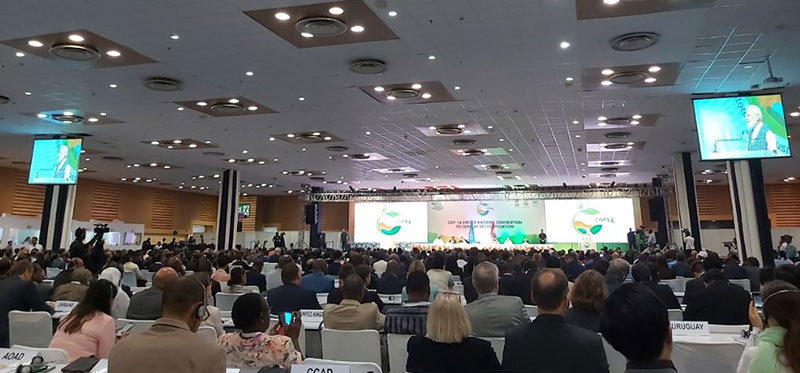September 10, 2019
The UN Convention to Combat Desertification COP 14 takes place on 2-13 September 2019 at the India Expo Center and Mart, in New Delhi, India. Around 196 countries and 94 environment ministers and tens of IGOs, NGOs and CSOs have taken part at the UNCCD COP 14 to address the issue of land degradation and desertification.
Prime Minister Narendra Modi addressing the high-level segment meeting of the ongoing COP14 to United Nations Convention to Combat Desertification (9th September 2019) said that climate and environment impact both biodiversity and land, and the world is facing the negative impact of climate change. PM Modi emphasized that India aims to increase the total area restored from land degradation to increase from 21 million hectares to 26 million hectares. He also added that India's tree cover has increased by 0.8 million hectares between 2015 and 2017.
Prime Minister of Saint Vincent and the Grenadines Ralph Gonsalves addressed the gathering and said desertification has been identified as the greatest environmental challenge of our time and climate change is making it worse.
United Nations Deputy Secretary-General Amina Jane Mohammed spoke about the steps that can be taken to combat climate change. She said we need to make small steps in order to achieve our bigger climate goals.
Addressing the audience, UNCCD Executive Secretary Mr. Ibrahim Thiaw outlined that UNCCD COP14 is set to define the following key directions of work:
Director General of SACEP Dr. Abas Basir during Parallel Ministerial Session on Fostering a Global Movement for Ecosystem Restoration said that we should develop effective policies and prioritize our activities to stop or minimize the land degradation at its all types; aim to scale up the restoration of degraded and destroyed ecosystems as a proven measure to fight the climate crisis and enhance food security, water supply and biodiversity. He added that better application of scientific knowledge and technology can improve food, water, and energy security, while reducing pressure on land and ecosystems. Building capacity at all levels is a key in this regard. Cross-border collaboration, south-south cooperation, sharing experiences and regional governance is a way to achieve the desired targets.
Photos
https://www.eastmojo.com
https://indianexpress.com



